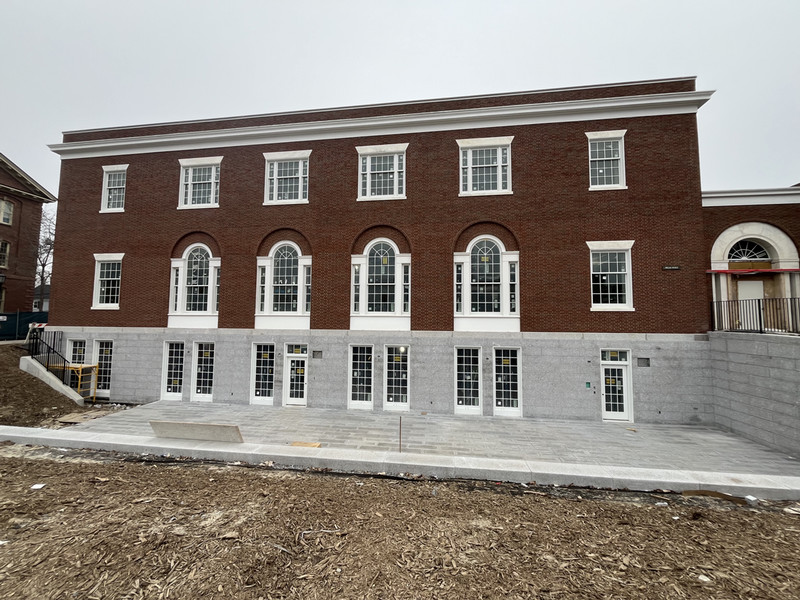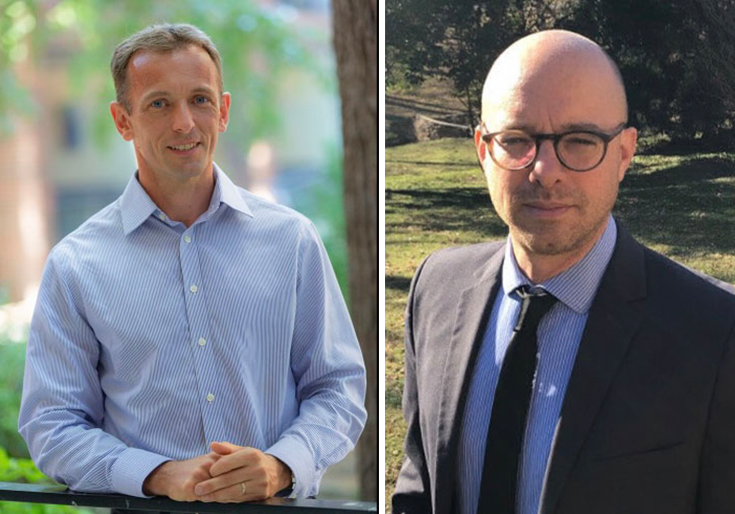Associate Professor Gillespie Has Big Plans for Russian Program
By Tom Porter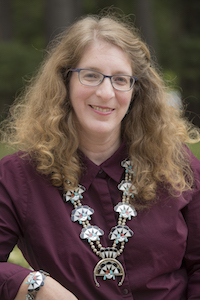
The appointment last year of Alyssa Gillespie to head Bowdoin's Russian program signaled a clear intention by the College to increase the visibility of the department. Now, as she heads into her second year here, the associate professor of Russian remains fully committed in her plans to expand the scope, size and relevance of the study of Russian.
"For the previous four or five years," said Gillespie, "the department’s courses had been staffed entirely by visiting faculty, so there was no one with the long-term commitment and vision needed to make it grow. In fact, the department was under most people's radar and some were even wondering if Russian had a future at Bowdoin at all."
When Gillespie arrived, Bowdoin had just one Russian major, who has now graduated. Now the department boasts four new majors and two new minors—still a small number, she admits, but a marked increase over the previous year.
"Likewise with my literature course, last year I had one upperclass student pre-register, but I ended up with seven in total as six first-year students signed up. For this coming fall, I already have nine upperclassmen on board for the literature/culture course I'll be teaching."
Education
Ph.D., University of Wisconsin-Madison
M.A., University of Wisconsin-Madison
B.A., Brandeis University
Professor Gillespie's research and teaching interests include Russian and Polish poetry, gender issues in literature, the poetry of exile, the psychology of poetic genius, Russian film and artistic culture, poetic translation, and Russian language at all levels.
She came to Bowdoin in 2016 after 17 years of teaching at the University of Notre Dame, where she was co-director of the program in Russian and East European Studies.
Russian culture
Over the past year, Bowdoin has offered three new courses on Russian literature and culture, including one looking at a thousand years of Russian culture, and one on post-Soviet Russian cinema.
"This year I'll be teaching a brand new course on the role of women in Russian literature, film and visual art during the Soviet and post-Soviet periods. This ties in with a series of events being put on by the Bowdoin College Museum of Art about Soviet propaganda, timed to coincide with the centenary of the Bolshevik Revolution. The exhibit will include an entire section dedicated to images of women in Soviet propaganda art."
Gillespie plans to teach one course per semester on literary and/or cultural topics. "Taught in English, these are really important, designed to get students excited about the richness of Russian culture and draw them into the subject in the hope they'll go on to learn the language. Winston Churchill famously quipped that Russia is a riddle wrapped in a mystery inside an enigma, and this is no less true today than it was back then. It’s fascinating and fun for students to begin unwrapping these mysteries, but it is also a matter of national security that we produce a new generation of Russia specialists who possess deep linguistic and cultural expertise."
Learning the language
Mastering the Russian tongue, Gillespie admitted, is no easy task, which is why she encourages students to start language classes in their first or second year—ideally the first year. "Learning the Russian language is a huge process, and the difference between three and four years of instruction is significant." At the same time, she pointed out that students’ preconceptions about the challenges of the language are sometimes unfounded. For instance, new Russian students often fear learning the Cyrillic alphabet, but according to Gillespie, “we cover that during the first few days of class, and by the end of week one, students are totally comfortable with it!”
Gillespie will be teaching elementary Russian this year, while incoming post-doctoral instructor Nicholas Kupensky from Yale will be teaching the intermediate level. In the second semester, in addition, Gillespie said Kupensky will go on to teach a literature course, possibly specializing in Tolstoy and/or Dostoyevsky.
"Of the seven students who took intermediate Russian last year, three are now preparing to study abroad while the remaining four will be taking advanced language classes through a new collaboration with Yale using Bowdoin's new telepresence room" (built last year with a $925,000 Andrew W. Mellon Foundation grant.)
When the overseas students return at the end of next year, Gillespie said, "Bowdoin should have a robust group of six or seven Russian seniors for the 2018-19 academic year. In this way the department can steadily build as students progress through the years."
Another goal, she said, is to find a way to fund summer study overseas. "That's a big priority because it helps so much with proficiency, and some students will be unable go abroad for an entire semester because they're taking a double major."
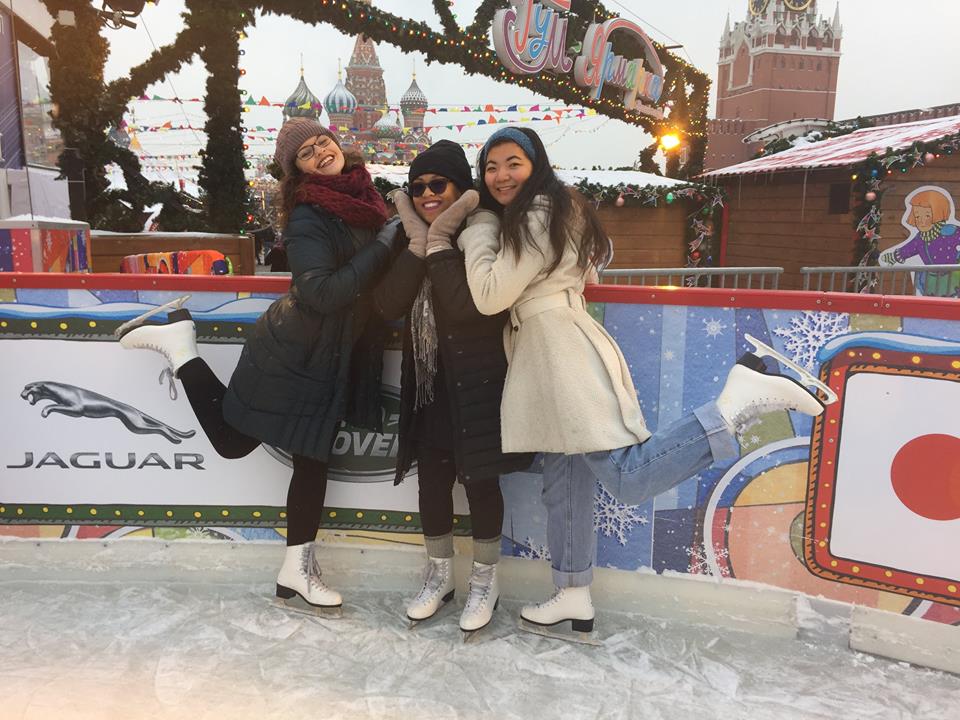






Extracurricular activities
It's important for Russian students to build a sense of community, said Gillespie. At Notre Dame, where she taught previously, Gillespie set up a Russian choir. While Bowdoin doesn't yet have the scale for something like this, a thriving Russian club has been established in the past year.
The club, which is student-run but advised by Gillespie, plans to organize Russian cultural events such as movie screenings, holiday celebrations and food nights. In addition, Gillespie regularly invites students to her house to sample home-booked borscht, blini and other Slavic dishes.
Gillespie has also got Bowdoin involved with an organization called "Stage Russia," which brings filmed stage productions from Russia's most renowned theater companies, and shows them in cinemas around the world in HD. "We brought three of those to Bowdoin last year, including Pushkin's Eugene Onegin. We were the only place in Maine and one of the few in New England where you could see these high quality productions in Russian with English subtitles." Next spring the Russian department will be screening productions of two of Chekhov’s plays, The Seagull and Uncle Vanya.
In addition, planning is already underway for a diverse series of co-curricular and extra-curricular events over the next two years, including performances by two different ensembles of Russian folk music and dance, talks on the Russian Revolution in connection with the Soviet poster exhibition this fall, and a lecture series dedicated to environmental studies topics in Russian culture and history slated to take place in 2018.
Revamped curriculum
Gillespie has spent much of the last year reshaping Bowdoin's Russian curriculum and setting up a two-pronged Russian major, where students can choose to specialize either in language and cultural studies, or adopt an inter-disciplinary approach including history and politics.
“It’s exciting because students will be able to follow their own particular interests and take advantage of the broad interdisciplinary expertise in Russian studies that we have here at Bowdoin, while also achieving a firm foundation in Russian language and cultural studies.”
These new requirements are being phased in from this year, said Gillespie, who hopes that a steady increase in the number of Russian majors will eventually lead to the hiring of more faculty. Bowdoin's Russian department is currently only two-strong, including Gillespie and the post-doctoral fellow. Nevertheless, even with these small numbers, the department is already able to do a lot, in part thanks to its close collaboration with two other dedicated Russian studies faculty on campus, associate professors Page Herrlinger (history) and Laura Henry (government and legal studies).
After College?
Judging on what she's been hearing from employers, Gillespie said these are good times to be a Russian graduate. "Folks in the private and public sectors have been talking about a dearth of young people with an expertise in Russian over the last ten to fifteen years.
"Twenty years ago there was a short-sighted view prevailing that Russia's global importance had diminished, and consequently fewer students were taking Russian. This, of course, has proved not to be the case and now we've missed a generation of graduates."
Aside from leading to obvious careers in areas like politics, diplomacy or international law, a Russian degree has other benefits, said Gillespie. It develops skills that employers value, such as critical thinking, public speaking, and analytical writing, as well as habits of mind that are important in a global and multi-cultural world, like empathy, creativity, and cross-cultural awareness. Moreover, says Gillespie: "I hear from students all the time that whatever direction they go in, having Russian on their resume is the number one question in the job interview. It's impressive and it makes you stand out from the crowd."
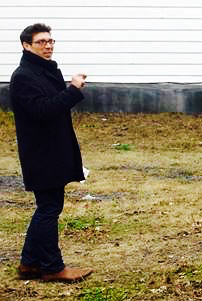
A New Face in the Russian Department
Nicholas K. Kupensky
Andrew W. Mellon Postdoctoral Fellow in Russian
Education
Ph.D., Slavic Languages and Literatures, Yale
M. Phil., Slavic Languages and Literatures, Yale
B.A., Comparative Humanities, Russian, English, Bucknell
A scholar of Soviet Cultural Studies, Kupensky's research investigates the intersection of aesthetics, economics, and politics in Russia, Ukraine, and the United States.


